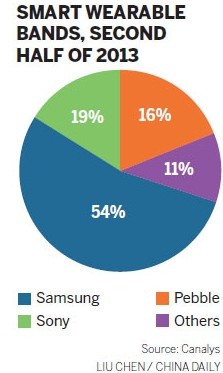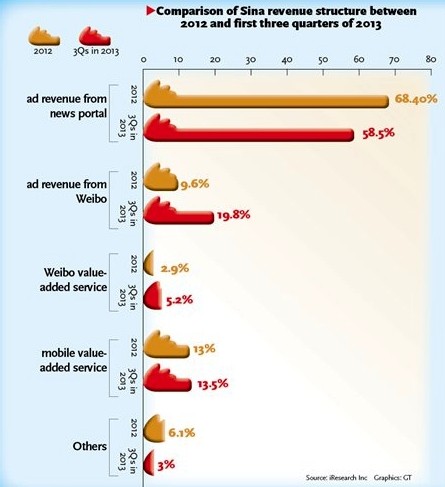China Unicom to announce 4G services
February 28th, 2014China United Network Communications Co Ltd, known as China Unicom, said on Thursday that it would announce its official TD-LTE 4G services and packages in 25 major cities in China on March 18.
"The 4G service will be expanded to 56 cities by May 17 and reach 300 cities by year-end," said Lu Yimin, executive director and president.
Lu said that the company is actively building its TD-LTE network infrastructure nationwide. It's also conducting a large-scale test of FDD-LTD services on its current WCDMA technology.
Three carriers in China received licenses in December to operate 4G services. Two-China Mobile Communications Corp and China Telecom Corp Ltd-have already launched 4G services in the mainland.
China Mobile had 4G services in 16 cities as of Dec 31, catering to the smartphone market. China Telecom offered 4G services starting in January, but only through data cards and wireless routers.
Chang Xiaobing, chairman and chief executive officer of China Unicom, said that operators will adapt different approaches to provide 4G services and the company is communicating with relevant government authorities to speed up the issue of FDD-LTE licenses.
The country's biggest fixed-line operator increased its 3G base stations by 76,000 to 407,000 in the past year. 3G service revenue rose 50 percent to 89.8 billion yuan ($14.6 billion), accounting for about 60 percent of China Unicom's mobile service revenue.
"Our first priority in 2014 is still to improve our 3G WCDMA network and set up our TD-LTE gradually. Meanwhile, we will prepare to deploy the FDD-LTE network, if approved by the government," said Chang.
Lu said the company will have advantages over competitors in terms of 4G services.
"We have a sound user base in the north of China, and we are the biggest internet operator in the world," he said.
As of January, the company had 280 million mobile subscribers, having added 41.6 million new ones in 2013.
China is expected to have 30 million 4G mobile network service subscribers by year-end, according to the Ministry of Industry and Information Technology.
The company reported operating revenue of 295 billion yuan in 2013, up 18.5 percent. Net profit climbed 46.7 percent to 10.4 billion yuan.
Baidu's profits flat on marketing costs
February 27th, 2014China's largest search engine, Baidu Inc., said Thursday that its net profits slid 0.4 percent year on year in the fourth quarter of last year to 2.78 billion yuan (460 million U.S. dollars).
The slight drop was mainly due to climbing marketing costs, especially for its mobile products.
The company's expenditures in sales, general business and administration surged 135.1 percent year on year to 1.86 billion yuan in the final quarter, according to an unaudited business statement.
Its revenue surged 50.3 percent from a year earlier to 9.52 billion yuan in the final quarter, indicating healthy growth.
Li Yanhong, the company's chief executive, said the company has made remarkable progress in the mobile business and established a leading position in the mobile market, including in search, mobile application distribution and location-based services.
In the fourth quarter, mobile business accounted for more than 20 percent of Baidu's revenue, Li said.
In 2013, the company's total profits edged up 0.6 percent to 10.52 billion yuan, and its total revenues soared 43.2 percent to 31.94 billion yuan.
Brand challenge of smart and wearable bands
February 25th, 2014
Chinese telecom giant Huawei Technologies Co Ltd has shown faith in the fledgling smart wearable market with the world's first hybrid smart band for both Bluetooth calling and fitness tracking.
Shenzhen-based Huawei demonstrated TalkBand B1 at the Mobile World Congress held in Barcelona, Spain, on Sunday.
The smart band, which is worn on the wrist, has a 1.4-inch, flexible organic light-emitting diode (OLED) display and removable earpiece.
Huawei said the device can connect to people's smartphones so they can stay updated with all the information they need with just a quick glance.
The TalkBand B1's fitness tracking feature can record how many steps one has taken, what one's sleep quality is and how many calories one has burned, according to Huawei.
The product will be available for 99 euros ($136) and be out in China next month, whereas Japan, the Middle East, Russia and Western Europe will have to wait until the second quarter of 2014.
Richard Yu, chief executive officer of the Huawei consumer business group, said the company needs to start early in order to acquire a good position in the wearable device industry.
"Because (the smart band market) is new, manufacturers can only march forward by taking tentative steps," Yu said at a news briefing in Barcelona.
Huawei is not the first Chinese company to launch a smart wearable product.
ZTE Corp, Huawei's crosstown rival, released its first smart watch in Las Vegas at the Consumer Electronics Show in January.
Zeng Xuezhong, ZTE's executive vice-president, pointed out that the wearable gadgets market is a "blue sea", since no company currently dominates this new field and every player has an equal opportunity.
Global smart-watch shipments reached a record 1.9 million units in 2013, according to Strategy Analytics, a US-based research company. Matt Wilkins, the company's director, said, "We estimate that less than 1 percent of all smartphones shipped worldwide were bundled with smart watches in 2013, so there remains huge scope for smart-watch growth."
"It is very early days, of course, but the smart-watch market is starting to take shape," Wilkins said in a research note.
South Korea-based Samsung Electronics Co Ltd, of course, poses the most obstacles for Chinese players hoping to gain a major share in the smart wearable market.
Samsung accounted for more than half of the world's smart band shipments in the second half of 2013, according to research firm Canalys.
In the same period, Sony was the No 2 smart-band vendor, with a 19 percent global share.
"Samsung launched Galaxy Gear with a major marketing push that received significant consumer interest," said Chris Jones, principal analyst at Canalys. "Shipments of the device took Samsung to the top of the smart-band category, although disappointing sell-through will necessitate more promotional activity in coming months."
Canalys estimated this will be the year that wearables become a key consumer technology. The smart-band segment is expected to reach 8 million annual units shipped.
Daniel Matt, another Canalys analyst, said he expects the high-margin smart bands that incorporate sophisticated sensor technology will offer vendors great profit potential.
"With increased awareness about personal well-being, having a computer on your wrist will become increasingly common," Matt said in an email to China Daily.
Huawei's Yu predicted that smart-band gadgets likely will utilize cloud technology and that more and more smartphones will be tied to specific wearable products in the near future.
Sina Weibo mulls IPO: report
February 25th, 2014
Comparison of Sina revenue structure between 2012 and first three quarters of 2013 Source: iResearch Inc, Graphics: GT
China's Twitter-like microblogging service provider Sina Weibo is mulling raising a $500 million share issue in the US for the second quarter of 2014, a media report said Monday.
The company has hired Goldman Sachs and Credit Suisse to manage the New York listing, the Financial Times reported Monday, citing two people familiar with the matter.
Sina Weibo's public relations office was unavailable for comment when contacted by the Global Times as of press time.
Alibaba Group, China's leading e-commerce platform, paid $586 million for an 18 percent stake in Weibo in April last year, valuing the microblogging business at $3.3 billion.
Alibaba's public relations department also declined to comment on the issue Monday when contacted by the Global Times.
Normally Internet companies offer 10-15 percent of their stake for IPO, meaning Sina Weibo could be now worth about $4-5 billion, Wang Guanxiong, a Beijing-based expert on IPOs, told the Global Times Monday.
Sina is due to report its fourth-quarter earnings after the close of trading on Monday in New York.
Some analysts expect its Weibo platform to reach breakeven in the fourth quarter of 2013.
"Turning profitable will be the basis for Weibo's IPO," Lin Juan, analyst at research firm Wedge Partners, said in a research note released earlier this month.
"We think Weibo is ready for IPO since management restructuring has finalized, as well as the platform turning profitable," Lin noted.
In the previous quarter that ended September 30, 2013, advertising revenues generated by Sina Weibo posted a 125 percent year-on-year surge to $43.7 million, while non-advertising revenues from Weibo's value-added services, such as Weibo membership fees and games, also roared by 121 percent year-on-year to $9.7 million.
"Alibaba's joining in has speeded up the microblogging platform's commercialization process," Ding Daoshi, deputy managing editor of IT website sootoo.com, told the Global Times on Monday.
Sina Weibo's listing comes at a time when microblogging services in China are losing appeal due to strengthened government regulation and fast emergence of other social networking services, analysts said.
The number of Chinese microblogging users dropped 9 percent year-on-year to 280.8 million by the end of December 2013, China Internet Network Information Center said in a report published on January 16.
The report sent Sina's share price tumbling 7 percent on the same day.
Weibo is facing increasing competition with Tencent Corp's mobile messaging app WeChat, which is more private than Weibo, Ding said.
Sina Weibo's daily active users amounted to 60.2 million by the end of September 2013, while WeChat boasted 272 million monthly active users, data from the two companies showed.
Sina Weibo's offering also follows a number of Chinese companies which have been flocking to the US stock markets in their biggest numbers since 2010.
"The current market environment is favorable to China-based Internet companies, as US investors have gradually regained their appetite for Chinese stocks based on better performance of some newly listed Chinese firms since the second half of 2013," Li Ling, an analyst at ChinaVenture Investment Consulting, told the Global Times on Monday.
Jd.com, a major online platform in China, announced in January a plan to raise $1.5 billion in a US IPO that would be the largest by a Chinese Internet company.
Property developers slash home prices
February 24th, 2014Two property developers slashed their prices and created turmoil in the Hangzhou housing market, the local Qianjiang Evening News reported Sunday.
Hangzhou-based DoThink Real Estate slashed the price of 200 apartments by 12 percent from 18,000 yuan ($2,956) to 15,800 yuan per square meter on Tuesday. The homes immediately sold out.
Zhejiang Guanghong Real Estate Development Co announced a 4,000 yuan cut in a project on Friday, prompting angry homeowners to topple a model
China to Welcome More Professionals from Abroad
February 21st, 2014China will recruit more top-notch professionals from abroad this year, said the country's human resources authorities on Wednesday.
It is hoped the high-level experts will fully engage in the country's development, said a statement from the Organization Department of the Communist Party of China (CPC) Central Committee, after a national meeting of Party and government officials in charge of human resources.
China has operated a recruitment program, named "Plan 1,000", to attract overseas Chinese experts to build their careers in the country, since 2008.
So far 4,180 people have been recruited, 861 of them last year, the statement said.
These professionals, mostly scientists, have contributed to research in bioscience, plasma physics, nuclear technologies, space programs and satellites, it said.
But the government is also working on rules to end contracts with those who do not meet the needs of the country or fail to do their jobs, the statement added.